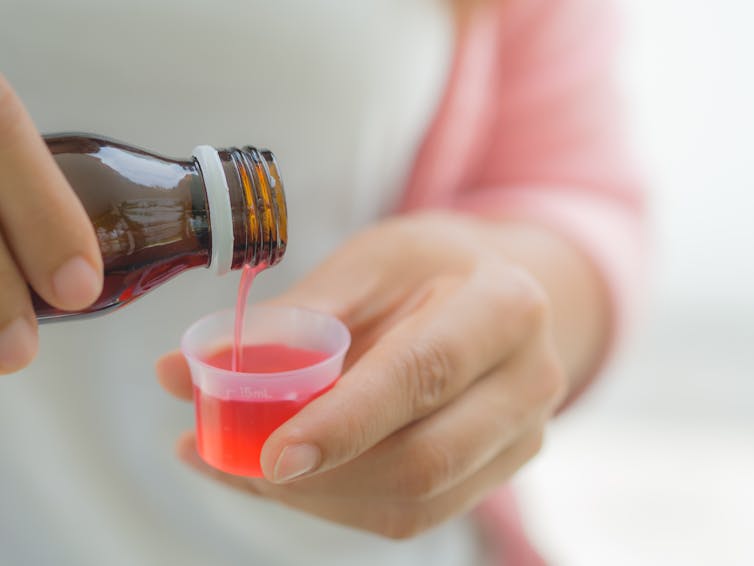Antibiotic shortages are putting Aboriginal kids at risk
- Written by Asha Bowen, Head, Skin Health, Telethon Kids Institute
At any time, almost one in two Aboriginal children living in remote areas will have a school sore. That means right now, there are an estimated 15,000 children needing treatment.
School sores can be painful and itchy. But left untreated, they can lead to rheumatic fever, bone infections or sepsis.
The most effective and tolerable antibiotic to treat school sores is in short supply, and this is putting Aboriginal kids at risk of life-threatening infections.
Read more: Why simple school sores often lead to heart and kidney disease in Indigenous children
What are school sores?
School sores (or Impetigo) are common in Aboriginal children living in remote areas due to the association with scabies, tinea and head lice, which are also very common.
When their skin or scalp is itchy, children may scratch and break the skin, allowing the bacteria that cause school sores to enter. Insect bites and minor trauma can also become a site for a school sore to develop.
School sores are caused by the bacteria Staphylococcus aureus and Group A Streptococcus. These bacteria are highly contagious and spread easily from child to child.
What are the treatment options?
School sores are usually treated with an antibiotic cream when only a few kids have them. But because these sores are so common in remote communities, it’s recommended that an oral antibiotic or an injection is used to prevent the development of antibiotic resistance.
Both the oral antibiotic and the injection work well to treat school sores, but we know many kids won’t want the needle.
Current guidelines recommend treating school sores with the antibiotic trimethoprim-sulfamethoxazole (known by the brand names Bactrim and Septrin).
Most kids under eight years old need to take a liquid antibiotic. The Bactrim brand antibiotic syrup tastes good and is easy to swallow. Naturally, kids prefer it to a painful injection.
In September 2018, Bactrim syrup was withdrawn from the market, possibly due to a company merger, leaving the Septrin brand as the only remaining brand of this antibiotic in syrup form.
 It’s much easier to get kids to take a flavoured syrup than swallow a crushed up tablet, or have an injection.
From shutterstock.com
It’s much easier to get kids to take a flavoured syrup than swallow a crushed up tablet, or have an injection.
From shutterstock.com
This put a lot of pressure on the company making Septrin to increase the supply needed for kids all over Australia. But they couldn’t keep up with demand. The Septrin syrup has now been out of stock for eight months, which has affected the treatment of a large number of Aboriginal children with school sores.
The alternative for younger children is to crush the trimethoprim/sulfamethoxazole tablets, which tastes terrible and is not recommended by antibiotic regulators. It’s not very accurate for getting the dose right, particularly in the smallest kids.
Read more: What are school sores and how do you get rid of them?
For example, a two-year-old will weigh about 12kg. The recommended dose of trimethoprim/sulphamethoxazole for a child of this weight is 48mg trimethoprim. The tablets only come as 40mg trimethoprim or 80mg trimethoprim, making it tricky to get the required dose for this child. And guidelines have not anticipated this situation, so there is little to inform dosing decisions.
In recent months, we’ve heard the crushable tablets in another brand of the same medicine, known as Resprim, are now also out of stock.
How can antibiotics that kids need just disappear?
Drug shortages are a huge problem in health care.
Information about these stock outs filters to doctors and pharmacists haphazardly. There’s no coordinated process for this in Australia, and it can take weeks or months for the information to get to the health-care workers. Often they’ll only become aware of the shortfall when they have a patient who needs the antibiotic.
Mandatory reporting of drug stock outs to the Therapeutic Good Administration (TGA) by the manufacturers commenced in 2018 to address this. Time will tell whether it helps the flow of information.
Read more: Why are Aboriginal children still dying from rheumatic heart disease?
These problems are never simple. Old, cheap antibiotics are no longer on patent and not generally profitable for the manufacturers. These antibiotics are usually prescribed for short courses of three to five days, and so are rarely prioritised in comparison to the long-term medications required for the older population (such as diabetes or heart medications).
In a developed country with world-class health care, it’s unacceptable if an antibiotic needed to treat an infection is not available because we don’t have a national system for coordinating and maintaining antibiotic supply.
Why this drug shortage is a particularly concerning one
Skin sores are more than a nuisance condition. They make kids feel sick, take weeks to heal and may lead to absences from school.
The long-term problems of rheumatic fever, sepsis and kidney disease result in lifelong chronic ill health and are a much higher cost to the health system than a simple, cheap course of oral antibiotics to treat the skin sores before they become a bigger problem.
Read more: How discrimination and stressful events affect the health of our Indigenous kids
With 15,000 Aboriginal children at any one time needing this antibiotic to treat school sores, the demand is real.
Zoy Goff, antimicrobial stewardship pharmacist at the Perth Children’s Hospital, and Hannah Mann, regional pharmacist in the Kimberley and research partner for the Kimberley-based skin health trials, contributed to this article.
Authors: Asha Bowen, Head, Skin Health, Telethon Kids Institute
Read more http://theconversation.com/antibiotic-shortages-are-putting-aboriginal-kids-at-risk-114355



















